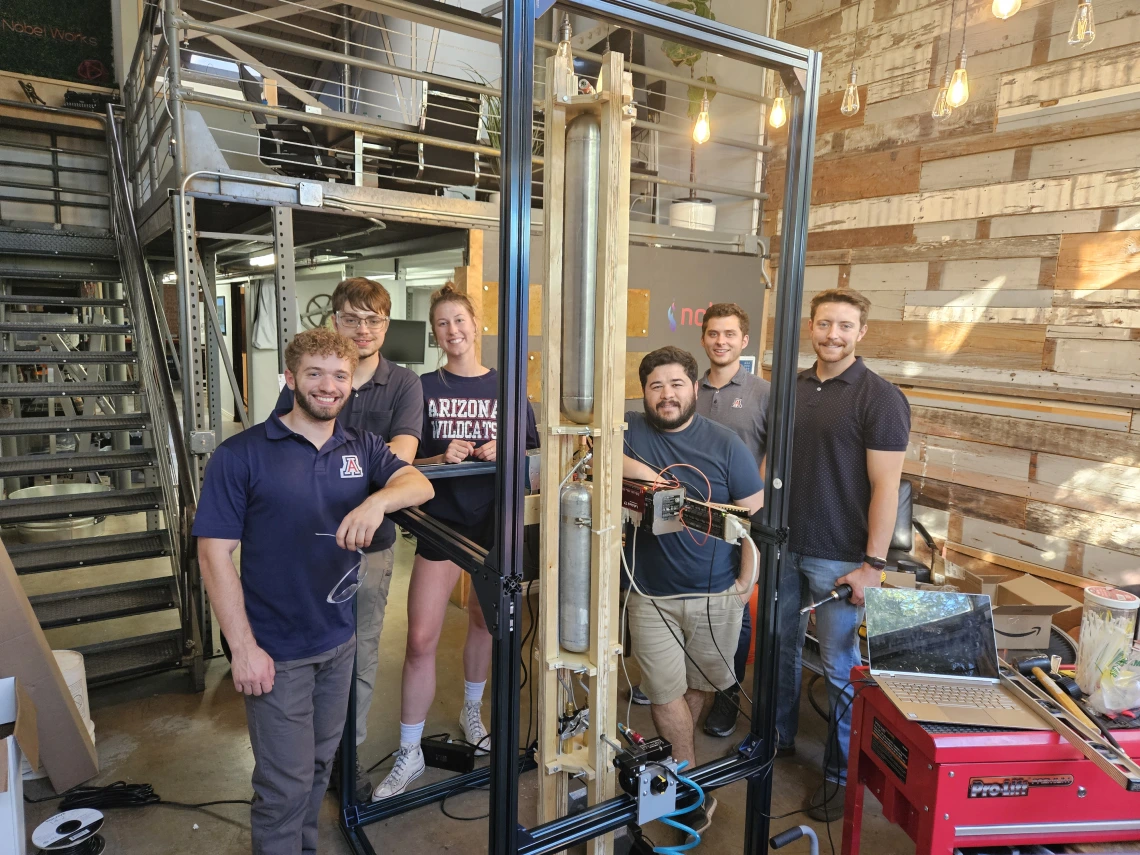Capstone Team Developing Cutting-edge Rocket Parts

Team 24028 and startup Nobel Works are developing technology that will make rockets more efficient.
For the 2024 academic year, one Interdisciplinary Capstone team is working on a novel rocket that has the potential to launch careers. Capstone Team 24028, composed entirely of aerospace and mechanical engineering majors, is working with Tucson startup Nobel Works to develop a new rocket engine that could result in more power for less fuel.
Two capstone teams are collaborating with Nobel Works in partnership with R3 Aerospace this year, building on work from last year’s capstone teams. Team 24028 student leader Andrew Lefcourt is finding the project particularly challenging because of the many factors that need to be considered. However, he expects the work to make the five-student team better engineers who are equipped to take on complicated tasks in their careers.
“Nobel is trying to do something that has never been done in the United States. The thought of being a part of something so revolutionary got me excited,” Lefcourt said. “My dad is also a mechanical engineer, and his specialty is working on rocket motors, so I have always been interested in them.”
According to Nobel Works, this technology has the potential to enhance fuel efficiency by up to 25%, and it has applications across various sectors, such as aviation, transportation and energy generation.
“This program is a clear win-win-win for our company, the University of Arizona, and the senior design students,” said Nobel Works CEO James Villarreal, the student team’s project advisor. “The students get meaningful hands-on experience they wouldn’t get with paper-only designs. Between the two groups, our company has 10 bright students with different backgrounds and perspectives to focus on some of our biggest technical challenges.”
Four Projects in Two Years
In 2023, Nobel sponsored two UA teams, each with a distinct mission. One student team focused on improving heat management for Nobel’s rocket engines, while the other team worked on enhancing ignition systems. Villarreal said the students’ work impressed him: The heat management team developed and tested a chamber design that can cool the engine indefinitely. The ignition team built and tested various ignition designs, with the best system achieving a 99.7% success rate.
This academic year, Nobel is backing two new teams, both with a continued focus on rockets. One is tasked with optimizing engine nozzles for better rocket performance, while 24028 is building a high-powered liquid-propelled sounding rocket. Team 24028’s work builds on past teams’ progress and tackles the additional complexities of various rocket subsystems.
“In the UA rocket project, we aim to achieve a successful flight using our innovative rotating detonation engine. This technology has only been demonstrated in rocketry by a few countries: Poland and Japan,” Villarreal said. “Our second sponsored team is dedicated to enhancing nozzle efficiency. Traditional nozzle design methods for conventional rocket engines don't fully apply to the unique exhaust produced by a rotating detonation engine.”
In December 2022, the U.S. Air Force’s Research Laboratory awarded Nobel Works a Small Business Innovation Research contract to be employed with its rotating detonation engine.
“We get the chance to do something that has never been done before,” Lefcourt said. “I get to work with the brilliant mind of James Villareal at Nobel, and I get to work with some amazing peers on my team. I couldn't think of a better way to grow and prove myself.”

